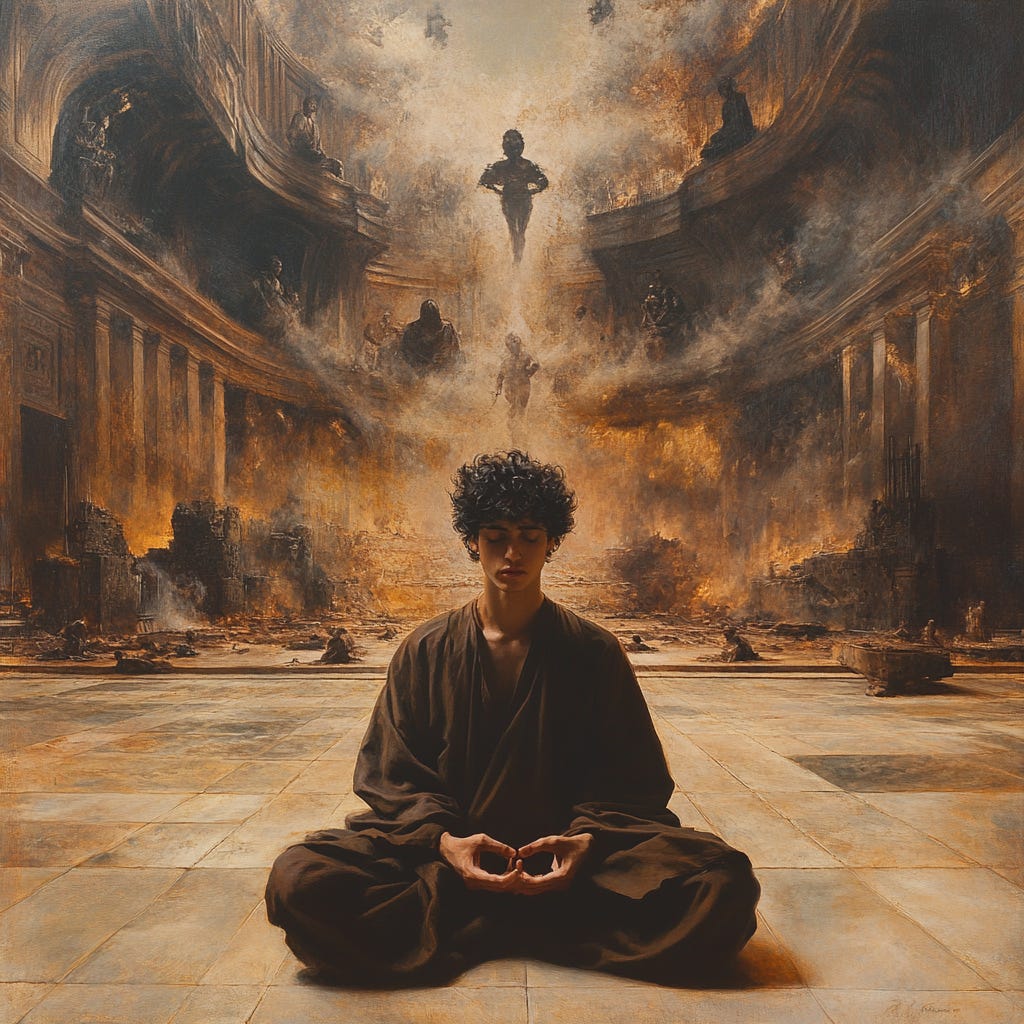The Inevitable Hero...
Since the earliest days of human sentience, the pull between free will and the uncontrollable forces of fate have fascinated us. Over thousands of years, through a vast breadth of cultures and peoples, the tensions between predestination and free will have been a subject of obsession, driving humans to examine and explore the internal and external forces that shape our paths. One such medium by which this subject is often explored is through tales of heroism and virtue, in which individuals must navigate the tension between forces beyond their control and their ability to shape outcomes.
In Frank Herbert’s Dune, Paul Atreides embodies this dynamic, existing at the intersection of predestination and free will. As the prophesied Kwisatz Haderach, Paul must reconcile his foreordained role with his personal desires and moral commitments, making him both a servant of destiny and an active shaper of it. This duality reflects broader philosophical questions about agency and leadership, as explored in Laozi’s Tao Te Ching and Plato’s Republic. Laozi emphasizes the importance of aligning with the natural, established flow (wu wei), while Plato elevates the use of rationality, order and virtue to forge one’s path. Paul’s journey in Dune reflects the Taoist concept of aligning with the natural flow while also partially embodying Plato’s ideal of the rational, virtuous leader. However, his prescience and supernatural abilities complicate both frameworks, revealing the inherent limitations of individual agency in a predetermined and interconnected universe.
Paul’s Predestined Path in Dune
Paul Atreides’ path in Dune is deeply influenced by the Bene Gesserit’s centuries-long breeding program, designed to produce the Kwisatz Haderach—a being of extraordinary power who could fulfill their strategic goals. Central to their plan was the deliberate seeding of religious prophecies across various cultures, including the Fremen, who came to believe in a revered, mythological, messianic figure that would someday free them from oppression and lead them to freedom. This manipulation ensures that when Paul arrives on Arrakis, the Fremen view him as the fulfillment of their long-awaited prophecy, creating a powerful alignment between their devotion and the Bene Gesserit’s aims. For Paul, however, this manufactured destiny is both a gift and a burden. The forced mantle of Messiah and Savior to the Fremen provide him with the resources needed to pursue his own aims, yet the devastating consequences of taking up the role prevent him from embracing it. Adding to this weight are Paul’s prescient visions, which allow him to see countless futures filled with pain and suffering - one in particular, in which he rises to power and unleashes the jihad, a devastating galactic war fought in his name. Though he has the ability to see and influence these outcomes, Paul resists the path laid out before him, as his conscience and rationality drive him to prevent suffering. This reluctance underscores the complexity of his relationship with fate; while his abilities grant him followers and influence, they also trap him in a role he did not intentionally choose, making him both a servant of destiny and its reluctant master.
The Taoist Perspective: Inevitability and the Flow of Destiny
In Taoism, the principle of wu wei emphasizes effortless action and aligning with the natural order rather than imposing one’s will through force or resistance. This philosophy underscores the inevitability of events, which unfold harmoniously when individuals act in accordance with the Tao, the underlying way of the universe. Paul Atreides’ journey in Dune reflects this Taoist perspective, as his prescient visions eventually compel him to accept the flow of events rather than striving to alter them entirely. A pivotal example is his acceptance of the role of Muad’Dib among the Fremen. Rather than continue to resist the mythology that surrounds him, Paul adapts to it, aligning himself with their beliefs and embracing into the role of their prophesied savior, which had been laid out for him. This decision is not an act of intentional striving but a moment of acceptance. Although Paul is reluctant to embody the role, he recognizes that surrender to this inevitable path is necessary. Time and time again throughout his journey, Paul stubbornly resists the course depicted in his prescient visions, until he finally cedes and accepts the future’s inexorability.
While Paul’s acceptance might suggest passivity within a preordained structure, it also reflects the Taoist ideal of inevitability, as his fate is moved by forces greater than himself. His choice to align with the predestined flow of events, though appearing deliberate, is ultimately a concession to the natural path. This balance between strategic choice and inevitable surrender demonstrates how Paul embodies the Taoist principle of acting in accordance with the natural order, however reluctant this decision may be.
The Platonic Perspective: The Hero as Rational Agent
In Plato’s Republic, the ideal hero uses wisdom, rationality, and pursuit of the greater good to guide their decisions and forge their path. The philosopher-king is the ideal leader, governing with wisdom, rationality, and a commitment to justice, shaping both the state and its destiny. The philosopher-king’s rule is grounded in the harmony of the rational, spirited, and appetitive parts of the soul, leading to virtuous leadership that ensures the well-being of the state. Like the philosopher-king, Paul Atreides uses his intellect and inherent abilities to guide his decisions for the greater good, despite the personal toll these decisions take. His strategic alliances, military tactics, and his decision to ultimately accept his role as religious leader and prophet reflect his rational approach to leadership, even as these choices run counter to his personal desires. For instance, Paul is initially reluctant to embrace his role as a messianic figure who leads the Fremen into the jihad he foresees, fearing the consequences that could follow his ascent. Yet, he ultimately chooses to step into the role in order to prevent the most suffering for the benefit of the greater good, despite the immediate costs, a decision rooted in rationality and justice. Similarly, he chooses to marry Irulan, the daughter of the former Emperor rather than his lover and the mother of his child, Chani, setting aside his personal feelings in order to forge a stable and legitimate empire for the good of his people.
This parallels Plato’s ideal of the philosopher-king, who, though reluctant to rule, does so for the good of the state. However, Paul’s prescience complicates the Platonic ideal of free will. While he possesses the wisdom and rationality of the philosopher-king, his ability to foresee multiple potential outcomes restricts his choices, binding him to certain paths. Despite exhibiting qualities of a Platonic rational agent, Paul’s foreknowledge limits his freedom to fully exercise free will, as he is constrained by the necessity of choosing the most just and least destructive future. In this way, the inevitability of Paul’s choices subverts Plato’s model of the hero as one who shapes destiny purely through reason and free will, revealing the complexities of leadership in a world governed by both fate and rational action.
Reconciling Taoism and Platonism in Paul’s Journey
Paul’s journey in Dune exists at the intersection of both philosophical frameworks: Taoism’s emphasis on surrendering to the natural flow of events, and Platonism’s view championing rational control and agency in shaping one’s destiny. These perspectives stand in tension—Taoism advocates for acceptance and effortless action, while Plato asserts that true heroism lies in exercising one’s rational will to impose justice and order. Paul embodies this paradox, as he simultaneously surrenders to the inevitability of his prescient visions while actively shaping the course of his future through calculated decisions. His eventual decision to submit to the predestined future aligns with Taoist inevitability, and his choice to cease resisting for the benefit of the greater good aligns with the Platonic virtues of rationality and order.
Yet, this choice, however rational and calculated, also limits his autonomy, for his knowledge of future events constrains him to paths that he believes he must take, rather than offering true freedom of choice. While Paul’s decisions are informed by his desire to be rational and virtuous, they are ultimately guided by the inevitability, not the exercise of free will.
This tension highlights the limitations of both Taoism and Platonism in explaining Paul’s heroism. Taoism cannot fully account for Paul’s active role in shaping his destiny, and Platonism falters because Paul’s rational decisions are heavily constrained by his prescient knowledge of his destiny. Thus, Paul’s journey transcends both frameworks, as his role as an inevitable hero challenges the dichotomy of fate and free will, suggesting that true heroism requires balancing surrender to external forces with active decision-making within constrained possibilities. His struggle with destiny and agency points to a more nuanced understanding of leadership and heroism, one that recognizes the intricate interplay between predestined forces and individual choice. Ultimately, Paul’s journey suggests that heroism is not a matter of absolute control or blind submission, but rather the ability to navigate the tension between fate and free will in a world where both are intertwined.





